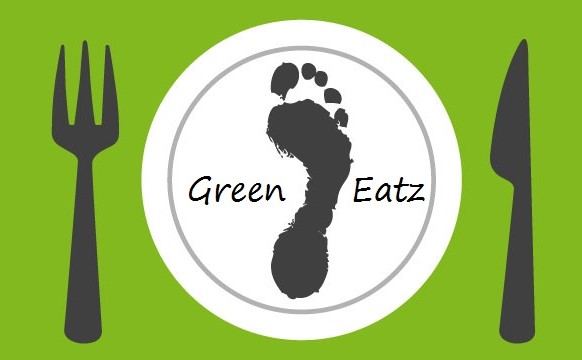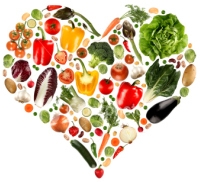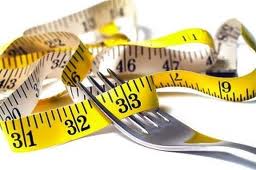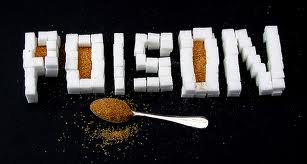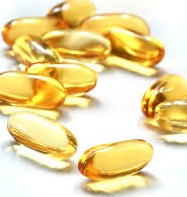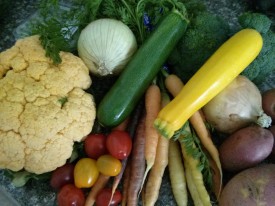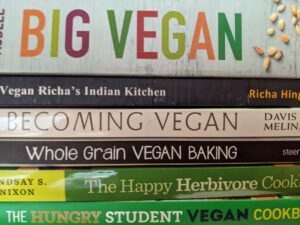Have you thought about giving up meat or just eating less? Going vegetarian is a great step in improving your health and it also helps in the fight against global warming.
What’s wrong with meat? Meat is high in saturated fat and animal protein. Most of us know that bad fats in the diet can lead to high cholesterol and increased risk of heart disease. But too much animal protein makes the body more acidic, another factor in heart disease. Vegetarian proteins are much kinder on the body as they do not create acidity. And of course, plant foods contain very little fat, and it is often healthy fat too.
Animal protein is also a major factor in osteoporosis. As the body is made more acidic by meat protein, calcium is taken from your bones to counteract that acidity. The liver also has to work hard to breakdown toxins that are released during animal protein break-down. These toxins are a major factor in arthritis and gout. A vegetarian diet is low in acid-forming foods and does not create the same toxins as a meat-based diet.
Many studies have also shown a strong link between meat-eating and bowel cancer. Vegetarians have been shown to have lower rates of many cancers, including bowel cancer.
Switching to a Vegetarian Diet
It can be hard switching to a diet based on plant proteins after years of relying on meat, so it’s best to take it slowly and gradually make the change. It is also important to move to a more natural, whole-foods diet rather than just switching to using processed meat substitutes.
Don’t make the same mistake as many new vegetarians…don’t switch cheese for meat. Cheese is also high in saturated fat, animal protein and salt, so is definitely not a healthy choice. Milk has many of the same health issues as meat and cheese, so it is better to get your calcium from plant-based foods.
Invest in a good vegetarian or vegan cookery book to give you ideas that take you outside the ‘meat and two veg’ box. Home-cooking is the best way to follow a healthy, vegetarian diet. Why not try vegetable curries, casseroles, risottos, pastas, big salads, soups, stir-fries and roasted vegetables. There is so much variety in vegetarian cooking you will never get bored with your food again!
Eating a Plant-based, Wholefoods Diet gives you more incentives to go vegetarian!
How do vegetarians get enough protein, iron and zinc?
Plant proteins provide all the necessary amino acids as long as you don’t rely too much on one food. Remember that the combination of rice ‘n’ beans provides a ‘perfect’ protein. Other great sources of vegetarian protein are beans, peas, lentils, nuts, whole-grains, tofu and soy.
If you eat a varied diet of whole-foods, it is unlikely that you will suffer from iron deficiency. Iron-rich plant foods include beans, lentils, chickpeas, green leafy vegetables, whole-grains and nuts. Remember that iron absorption is increased by eating vitamin C rich foods at the same time, such as potatoes, red peppers and carrots.
Your body may take a while to adapt to vegetarian sources of iron, as it is less easily absorbed than meat-based iron. If you feel tired or run-down on your vegetarian diet, take an iron supplement for a few months whilst you adapt.
Zinc is probably the area of most concern, especially if you are on a fully vegan diet. Many vegans have low zinc intakes as they tend to eat less than vegetarians or meat-eaters. It is important to make sure you eat zinc-rich foods such as whole-grains, seeds, nuts, legumes and beans and ensure that you are eating enough!
Symptoms of zinc deficiency include poor wound healing, decreased sense of taste, skin disorders, mouth ulcers and bad breath. If you need a zinc supplement, do not take it with meals as it interferes with iron absorption.
Green fact – livestock production is responsible for around half of all man-made greenhouse gases and uses 70% of all agricultural land.
